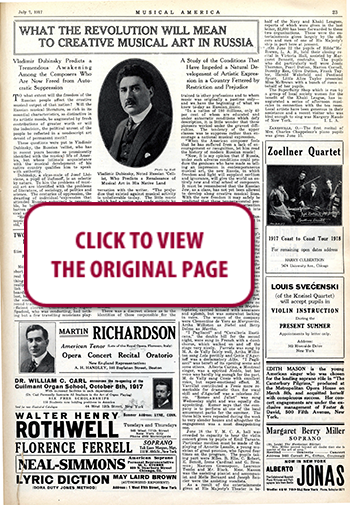 100 YEARS AGO IN MUSICAL AMERICA (203)
100 YEARS AGO IN MUSICAL AMERICA (203)
July 7, 1917
Page 23
WHAT THE REVOLUTION WILL MEAN TO CREATIVE MUSICAL ART IN RUSSIA
Vladimir Dubinsky Predicts a Tremendous Awakening Among the Composers Who Are Now Freed from Autocratic Suppression—A Study of the Conditions That Have Impeded a Natural Deve\ opment of Artistic Expression in a Country Fettered by Restriction and Prejudice
TO what extent will the freedom of the Russian people affect the creative musical output of that nation? Will the Russian musical literature, so rich in its essential characteristics, so distinctive in its artistic moods, be augmented by fresh contributions of greater worth or will the indecision, the political unrest of the people be reflected in a nondescript art devoid of permanent merit?
These questions were put to Vladimir Dubinsky, the Russian ‘cellist, who has in recent years become so prominently identified with the musical life of America, but whose intimate acquaintance with the musical development of his native country qualifies him to speak with authority.
Dubinsky, a classmate of Josef Lhévinne, a pupil of Safonoff, is an eclectic by nature. To him the problems of musical art are identified _with the problems of literature, of sociology; of politics and science. The centuries of oppression, the dwarfing of individual expression that attended Russian autocracy is responsible, he believes, for the comparatively barren condition of Russian national musical art to-day.
“Remember that Russia’s cultivated music is not more than seventy-five years old,” he declared, in the course of a conversation with the writer. “The prejudice that existed against musical activity is unbelievable to-day. The little music which had a vogue was made entirely by foreigners, particularly the Germans and the Italians. Then came Glinka, the ‘Prophet Patriarch’ of Russian music, and his successors, Balakireff, Rimsky-Korsakoff, Cui, Borodin and Moussorgsky—virtually all men who had been trained the other professions and to whom music was originally a pastime only—and we have the beginning of what we know to-day as Russian music.
“In a nation of 180 millions, only 40 per cent of whom are educated and under autocratic conditions which defy description, it is little wonder that these pioneers worked under the gravest difficulties. The tendency of the upper classes was to suppress rather than encourage a national musical expression.
“When the American composer feels that he has suffered from a lack of encouragement or recognition, let him read the history of modern Russian music!
“Now, it is my opinion that if Russia, under such adverse conditions could produce the geniuses who have made so·telling an impression in contemporaneous musical art, the new Russia, in which freedom and light will supplant serfdom and ignorance, will give the world an entirely new and vital school of composers. It must be remembered that the Russian Jew, as a class, has not yet been allowed to develop along creative musical· lines. With the new freedom it may safely be predicted that these temperamental people who have commanded attention merely as interpreters will flourish into creators.
“It is my firm conviction that the Russian revolution marks a turning point in the musical history of that country.




 RENT A PHOTO
RENT A PHOTO





